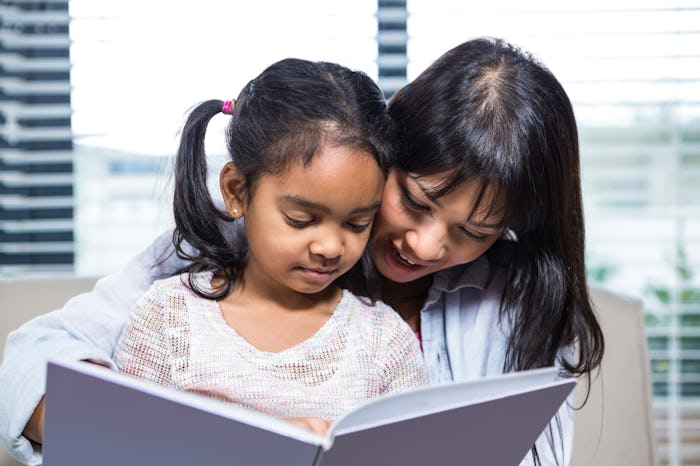Life

9 Benefits Of Reading With Your Kid, According To Science
If you're the parent of a young child, chances are you spend a lot of time reading to them. After all, it's fun to cuddle up with your little one for a few minutes and enjoy the fun stories and bright illustrations in children's books. But story time may be helping out your kid even more than you realize. In fact, there are many benefits of reading with your kid, according to science.
Some of the benefits are obvious. Kids who are read to frequently from a young age often have better language skills, for instance. But reading together may also help your kid develop logic skills, emotional recognition, and even higher math abilities. Basically? There is no downside to reading with your child.
Academics aside, having a regular story time together means that you and your child are guaranteed to enjoy a few minutes of bonding every day. In an increasingly busy and harried world, that alone is beautiful. Plus, your kid will associate reading with the comfort of your hug and the sound of your voice. This is how lifelong readers are made. So whether you want to set your kid up for early academic success, better language skills, or even emotional development, pick up your favorite book and read away.
1They Develop A Richer Vocabulary
Books can introduce your kids to words that they may not otherwise encounter. "In books, newspapers, and magazines, the language is more complicated, more sophisticated," educator Jim Trelease, author of The Read-Aloud Handbook, told Huffington Post. "A child who hears more sophisticated words has a giant advantage over a child who hasn't heard those words." Even a children's book probably includes some rich language that you normally wouldn't use in everyday speech.
2They Have Better Brain Development
Story time just might help your little one's brain grow. According to a statement from the American Academy of Pediatrics, reading to young children on a regular basis may help encourage brain development. Reading from developmentally appropriate books from a young age just might help your kids' thinking skills for life.
3They Build Phonetic Awareness
In addition to a richer vocabulary, reading also helps your kid grasp the fundamental building blocks of language. As noted in Kid's Health, reading helps improve your kid's phonetic awareness, or the understanding that words are created from smaller sounds. This means she'll be ready to hit the ground running once school starts.
4They Develop Pattern Recognition
Reading the same story over and over to your kid even presents its own benefits. As explained in Parents, when kids encounter the same text several times over, then they are able to grasp the patterns and sequences in the language. This may even help them develop logic skills: something to keep in mind when you're plowing through Goodnight Moon for the zillionth time.
5Their Reading Comprehension Increases
This one certainly makes sense. By reading to your child from an early age, you can help him develop better reading comprehension overall, as noted in the University of Michigan Health System. You're setting him up with skills he will use throughout his life.
6They Are Successful In School
Sure, an early mastery of reading may help your kid's language classes, but it may also boost her chances of succeeding at school overall. As explained by Reach Out & Read, children who have difficulty reading often struggle with schoolwork, which can lead to problems with absenteeism and delinquency. By setting your kid up for success early on, you may help him avoid serious academic problems down the line.
7They Build Multi-Sensory Development
If you've ever watched a baby engage with a book, you know that it's a full-sensory experience. He's going to look at the colors, touch the pages, and probably taste-test the cover. And as noted in Psychology Today, this kind of multi-sensory development is great for kids because it engages the creative and verbal areas of the brain. So give your baby plenty of opportunities to enjoy book, even if the majority of that time is spent gnawing on them.
8The Have Better Math Skills
It makes sense that readers would perform better in language classes, but the skills incurred by early reading may translate to other subjects as well. For example, according to the National Education Association, children who read at home have higher math scores than their peers. It looks like even those quantitative skills may be boosted with reading.
9The Develop Emotionally
Books can also help your kid learn some fundamental social and emotional skills. As noted in KidsHealth, your kid can pick up on different emotions by watching and responding to you read. This may require a bit of acting on your part, but hey — that's part of the fun, right?